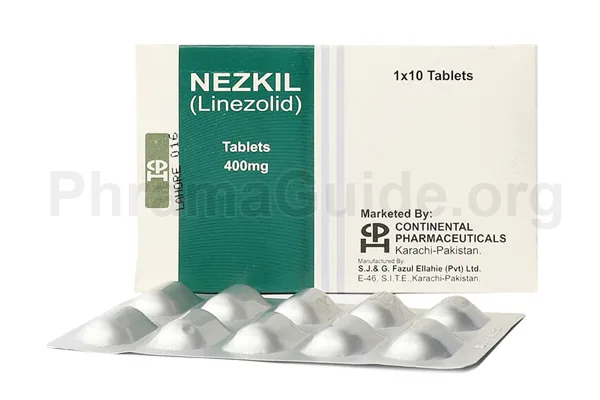Nezkil is an antibiotic used to treat various bacterial infections, including skin infections, pneumonia, and certain types of drug-resistant bacteria. Like many medications, Nezkil can have some common to moderate and less common side effects. These side effects can vary from person to person. Here are some common and less common side effects associated with Nezkil.
Common Side Effects
- Gastrointestinal Issues: Nausea, vomiting, diarrhea, and stomach upset are among the most common side effects of Nezkil. These symptoms are usually mild and may improve as your body adjusts to the medication.
- Headache: Some individuals may experience headaches while taking Nezkil. These headaches are typically mild to moderate.
- Dizziness: Feeling dizzy or lightheaded can occur, particularly when standing up quickly from a sitting or lying position.
- Taste Disturbances: A metallic or unpleasant taste in the mouth is reported by some people taking Nezkil.
- Insomnia or Sleep Disturbances: Difficulty sleeping or insomnia can happen in some cases.
- Rashes or Skin Reactions: Skin rashes, itching, or other allergic reactions may occur. Severe skin reactions are rare but require immediate medical attention.
- Changes in Blood Cell Counts: Nezkil can affect blood cell counts, leading to a decrease in certain types of blood cells, such as red blood cells, white blood cells, or platelets. Periodic blood tests may be necessary to monitor these levels.
Less Common Side Effects
- Optic Neuropathy: There have been reports of optic neuropathy (damage to the optic nerve) associated with long-term use of Nezkil. Symptoms may include changes in vision, including blurred vision, loss of visual acuity, and in severe cases, vision loss. This side effect is rare but requires immediate medical attention if suspected.
- Hypoglycemia: Some individuals, particularly those with diabetes or on medications that lower blood sugar, may experience low blood sugar levels (hypoglycemia) while taking Nezkil.
- Lactic Acidosis: In rare cases, Nezkil has been associated with lactic acidosis, a buildup of lactic acid in the body. Symptoms may include rapid breathing, weakness, muscle pain, abdominal discomfort, and irregular heartbeat. This is more likely to occur in individuals with kidney problems or those taking medications that can increase the risk of lactic acidosis.
- Liver Problems: There have been reports of elevated liver enzymes or liver function test abnormalities in some patients taking Nezkil. This may manifest as jaundice (yellowing of the skin or eyes), dark urine, abdominal pain, or persistent nausea.
- Allergic Reactions: While uncommon, severe allergic reactions to Nezkil can occur. Symptoms may include rash, itching, swelling (especially of the face, lips, or throat), severe dizziness, and difficulty breathing. These require immediate medical attention.
- Clostridium difficile Infection: Nezkil, like other antibiotics, can lead to an overgrowth of bacteria called Clostridium difficile, causing a severe form of diarrhea and colitis. This is more common with prolonged use and may require specific treatment.
- Respiratory Problems: In rare instances, Nezkil has been associated with respiratory side effects such as difficulty breathing, wheezing, or shortness of breath.

What is Nezkil?
Nezkil is one of the leading brands of Linezolid, manufactured and marketed by Continental Pharmaceuticals, Pakistan.
Nezkil : Available Formulations and Strengths
Presently, Nezkil is available in Tablets, Injection, and Suspension Forms with the following strengths.
Nezkil Tablets : 400mg and 600mg strengths.
Nezkil Injection : 200mg/100ml strength.
Nezkil Suspension : 100mg/5ml strength.
What Are The Possible Drug Interactions of Nezkil?
- Serotonergic Medications: Nezkil can interact with drugs that increase serotonin levels, such as selective serotonin reuptake inhibitors (SSRIs), serotonin-norepinephrine reuptake inhibitors (SNRIs), tricyclic antidepressants, triptans (used for migraines), certain opioids, and certain illicit drugs. This interaction can lead to serotonin syndrome, a potentially life-threatening condition characterized by changes in mental status, agitation, muscle twitching, and high body temperature. Avoid combining Nezkil with these medications without careful monitoring by a healthcare professional.
- MAO Inhibitors (MAOIs): Nezkil is an antibiotic with some properties similar to MAOIs. Combining Nezkil with MAOIs or within two weeks of discontinuing an MAOI can lead to a severe increase in blood pressure known as a hypertensive crisis. This includes medications like phenelzine, tranylcypromine, selegiline, and others.
- Sympathomimetic Agents: Nezkil may increase the effects of sympathomimetic drugs like epinephrine, norepinephrine, dopamine, and other medications that stimulate the sympathetic nervous system. This can lead to an increase in blood pressure and heart rate.
- Certain Antihypertensive Medications: Nezkil may interfere with the blood pressure-lowering effects of certain medications used to control hypertension, such as methyldopa and reserpine.
- Warfarin and Anticoagulants: Nezkil can enhance the effects of warfarin and other anticoagulants, leading to an increased risk of bleeding. Monitoring of blood clotting parameters is recommended when these medications are used together.
- Certain Psychiatric Medications: Some psychiatric medications, such as tricyclic antidepressants (e.g., amitriptyline) and bupropion, may have increased levels in the bloodstream when used with Nezkil, potentially leading to increased side effects.
- Rasagiline and Safinamide: These medications used to treat Parkinson’s disease should not be taken with Nezkil due to the risk of severe interactions.
- Opioids: There have been reports of increased opioid effects (such as respiratory depression) when opioids are used concurrently with Nezkil.

Leave A Comment